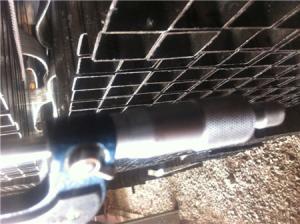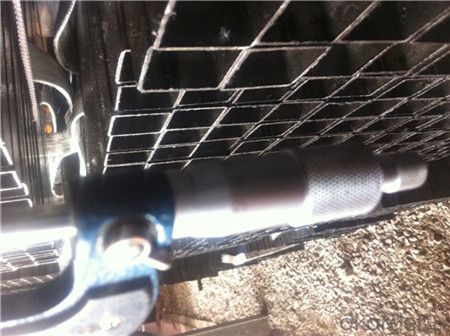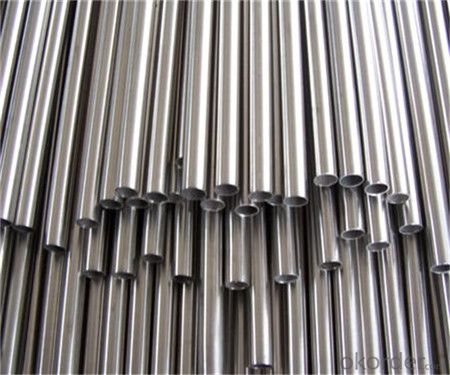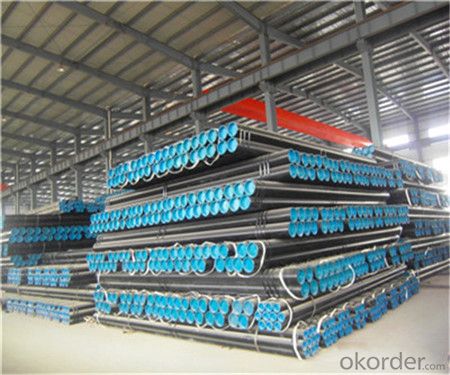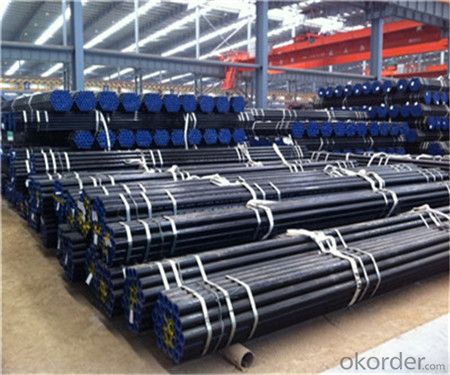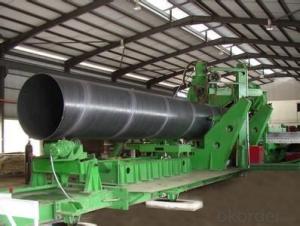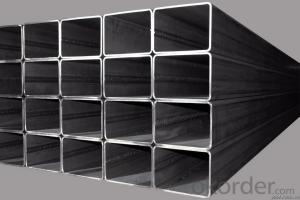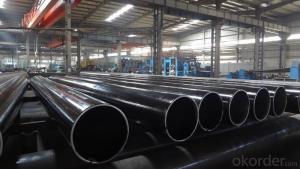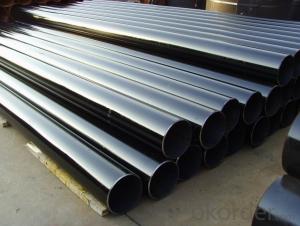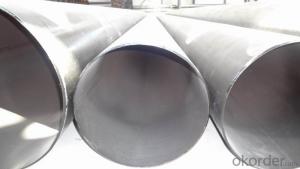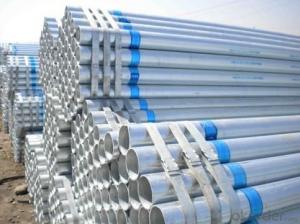ASME API 5L SSAW Steel Tube With Good Quality
- Loading Port:
- Tianjin
- Payment Terms:
- TT or LC
- Min Order Qty:
- 25 m.t.
- Supply Capability:
- 10000 m.t./month
OKorder Service Pledge
OKorder Financial Service
You Might Also Like
1、Structure of Welded Steel Tube:
Welded Steel Tube is formed by drawing a solid billet over a piercing rod to create the hollow shell. It is widely used in many field. Such as construction and so on.We are company that have many years experience and professional manager team and engineer team and sales team, sure we will provide you high quality of welded pipe and professioanl service. We pay great attention to after-sale service and aim to be your first choice in the future business cooperation. We hope we could be your career partner. If you need welded steel pipe, pls turn to us for help. We will try our best to satisfy your need.
2、Main Features of the Welded Steel Tube:
• High manufacturing accuracy
• The higher strength
• The small inertia resistance
• Strong heat dissipation ability
• Good visual effect
• Satisfy price
3、Welded Steel Tube Specification:
Standard | GB, DIN, ASTM ASTM A106-2006, ASTM A53-2007 |
Grade | 10#-45#, 16Mn 10#, 20#, 45#, 16Mn |
Thickness | 8 - 33 mm |
Section Shape | Round |
Outer Diameter | 133 - 219 mm |
Place of Origin | Shandong, China (Mainland) |
Secondary Or Not | Non-secondary |
Application | Hydraulic Pipe |
Technique | Cold Drawn |
Certification | API |
Surface Treatment | factory state or painted black |
Special Pipe | API Pipe |
Alloy Or Not | Non-alloy |
Length | 5-12M |
Outer Diameter | 21.3-610mm |
Grade | 20#, 45#, Q345, API J55, API K55, API L80, API N80, API P110, A53B |
Standard | ASME, ASTM |
1) Material:20#(ASTM A 106/A53 GRB.API5LGRB,GB),45#,16Mn,10#.
2) Specification range:OD:21.3-610mm,WT:6-70mm,length:6-12m or according to the requirement of clients.
3) Excutive standards:GB,ASME API5L.ASTM A 106/A53,Despite of the above standards,we can also supply seamless steel pipe with standard of DIN,JIS,and so on,and also develop new products according to the requirements of our clients!
4) Surface:black lacquered,varnish coating or galvanized.
5) Ends:Beveled or square cut,plastic capped,painted.
6) Packing:bundles wrapped with strong steel strip,seaworthy packing.
4、Packaging & Delivery
Packaging Details: | seaworthy package,bundles wrapped with strong steel strip |
Delivery Detail: | 15-30days after received 30%TT |
5、FAQ of Welded Steel Tube:
①How is the quality of your products?
Our products are strictly in accordance with international and domestic standard. We test on every pipe before delivery. Any quality certification or testing report you want to see, please tell us.
Guaranteed: If products’ quality is not in accordance with description as we provide or the promise before you place order, we promise 100% refund.
②How about the price?
Yes, we are factory and be capable of offering you the lowest price. One of our policy is that “ to save time and be absolutely honest with our business relationship, we quote as low as possible for every client, and discount can be given according to the quantity”, if you are interested in bargain and dissatisfy our factory price, just don’t waste your time. Our quotation is professional.
③Why should you choose us?
Choice happens because of our quality and price. Additionally, we can also offer professional products inquiry, products knowledge train (for agents), fast goods delivery, outstanding customer solution proposals. Our service formula: good quality + good price + good service=customer’s trust.
SGS test is available. Customer inspection before shipping is welcome. Third party inspection is OK.
6、 Welded Steel Tube Images:
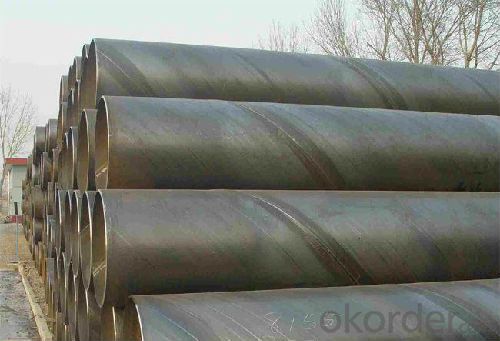
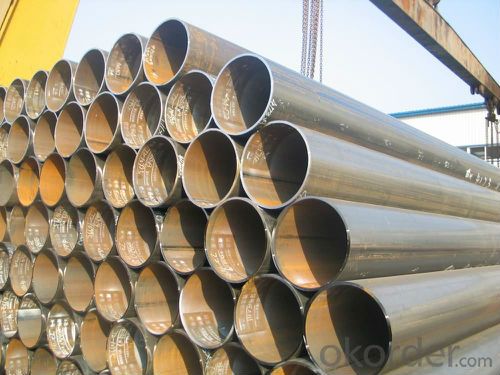
- Q: Can steel pipes be used for underground cable conduits?
- Yes, steel pipes can be used for underground cable conduits.
- Q: How are steel pipes used in the power generation industry?
- Steel pipes are widely used in the power generation industry for various purposes such as transporting fluids, gases, and steam, as well as for structural support and heat exchange. They are used in power plants for conveying cooling water, fuel, and exhaust gases, as well as in boiler systems for transporting high-pressure steam. Additionally, steel pipes are utilized for constructing heat exchangers, condensers, and other critical components, ensuring the efficient and reliable operation of power generation facilities.
- Q: What's the difference between round and round tubes?
- Round steel is solid and round tubes are hollow
- Q: Can steel pipes be used for underground applications?
- Yes, steel pipes can be used for underground applications. They are commonly used for underground piping systems in various industries such as water, oil, and gas. The durability and strength of steel make it suitable for withstanding underground conditions, providing reliable and long-lasting performance.
- Q: How are steel pipes used in the construction of natural gas power plants?
- Steel pipes are used in the construction of natural gas power plants primarily for transporting and distributing the fuel. These pipes are used to transport natural gas from the source to various components within the power plant, such as turbines and generators, for efficient combustion. Additionally, steel pipes are also used for cooling systems, waste gas removal, and other crucial functions in the overall construction and operation of natural gas power plants.
- Q: What is the maximum bending radius for steel pipes?
- The maximum bending radius for steel pipes depends on various factors, such as the pipe diameter, wall thickness, and the type of steel used. Generally, larger diameter pipes with thicker walls have a larger maximum bending radius. However, it is important to follow industry standards and guidelines to ensure the structural integrity of the pipe is maintained during the bending process. Consulting the manufacturer's specifications or referring to relevant codes and standards, such as the American Society of Mechanical Engineers (ASME) B31.1 or B31.3, can provide specific information on the maximum bending radius for steel pipes in different applications.
- Q: How are steel pipes protected against external mechanical damage?
- Various methods are employed to safeguard steel pipes against external mechanical damage. One notable approach involves the utilization of protective coatings, which act as a physical barrier between the steel surface and external forces like impact or abrasion. Coatings can be applied using techniques such as painting, epoxy coating, or wrapping the pipe with materials such as polyethylene or polypropylene. Another means of protection is the application of external casing or encasement. This involves installing casing pipes around the steel pipes to provide an additional layer of defense. These casing pipes are typically composed of resilient materials such as concrete, PVC, or ductile iron, which are resistant to external mechanical damage. Moreover, steel pipes can be safeguarded through the implementation of supports and restraints. Properly designed supports and restraints aid in evenly distributing external forces and preventing excessive stress or deformation on the pipe. This can be achieved by employing hangers, clamps, or brackets to secure the pipe in place and minimize the risk of mechanical damage. Furthermore, protective measures can be employed to prevent accidental impacts or collisions that may harm the steel pipes. This can involve the installation of protective barriers, fencing, or warning signs to alert individuals to the presence of pipelines and prevent inadvertent damage. In conclusion, a combination of protective coatings, casing, supports, and preventive measures are utilized to ensure the protection of steel pipes against external mechanical damage. These measures are crucial in maintaining the structural integrity of the pipes and ensuring their long-term performance and reliability.
- Q: How are steel pipes used in the manufacturing of boilers?
- Due to their strength, durability, and heat-resistant properties, steel pipes are essential components in the manufacturing of boilers. Boilers are utilized in various industrial and commercial applications to generate steam or heat water. The construction of boiler tubes is where steel pipes are primarily employed, as they function as the main heat transfer medium. Considering the high temperatures and pressure that these tubes are subjected to, it is crucial to use a material that can withstand such extreme conditions. Steel, with its excellent mechanical properties and corrosion resistance, is the ideal choice for this purpose. To create the boiler tubes, the manufacturing process involves shaping and sizing the steel pipes accordingly. These tubes are then connected to form a network of channels through which hot gases or water can flow. Depending on the boiler design requirements, the steel pipes utilized in this process are often seamless or welded. For the safety and efficiency of the system, the steel pipes used in boilers must meet stringent quality standards. They are subjected to tests to ensure their ability to withstand high pressure, temperature, and corrosion. Furthermore, inspections and tests such as ultrasonic testing and radiographic examination are conducted to identify any defects or flaws that might compromise the performance of the boiler. In conclusion, steel pipes play a critical role in the manufacturing of boilers by serving as the primary material for boiler tubes. Their strength, durability, and heat-resistant properties make them suitable for enduring high temperatures and pressure. These pipes undergo rigorous testing to guarantee their quality and reliability in creating efficient and safe boiler systems.
- Q: How are steel pipes used in the mining industry?
- Steel pipes are commonly used in the mining industry for various purposes such as transporting water, slurry, and other materials, as well as for ventilation and support systems in underground mines.
- Q: What is the difference between steel pipes and fiberglass-reinforced pipes?
- Steel pipes are made from a durable and strong material known as steel, which provides high strength and resistance to corrosion. On the other hand, fiberglass-reinforced pipes are made from a combination of fiberglass and resin, offering a lightweight and corrosion-resistant alternative. While steel pipes are commonly used for heavy-duty applications such as oil and gas pipelines, fiberglass-reinforced pipes are often preferred for applications that require resistance to chemicals and high temperatures, like in the chemical industry. Additionally, fiberglass-reinforced pipes have the advantage of being non-conductive, making them suitable for certain electrical applications.
Send your message to us
ASME API 5L SSAW Steel Tube With Good Quality
- Loading Port:
- Tianjin
- Payment Terms:
- TT or LC
- Min Order Qty:
- 25 m.t.
- Supply Capability:
- 10000 m.t./month
OKorder Service Pledge
OKorder Financial Service
Similar products
Hot products
Hot Searches
Related keywords
